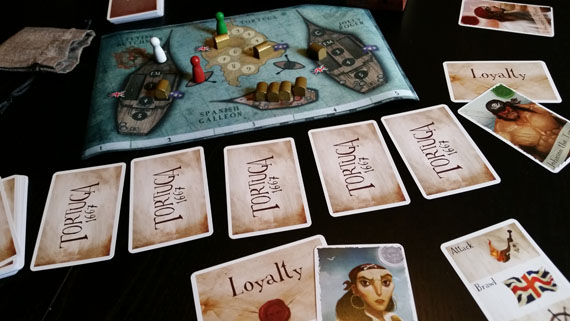We've had Tortuga 1667 for nearly a year, and we've only played it twice. That's not entirely uncommon given how many games we have, but I find myself wondering why we haven't gotten it to the table more often.
A big part of it is that Tortuga 1667 wants to be a social deduction game, a genre of game that generally requires a large number of players to be interesting, and most of our non-RPG gaming tends to be done in groups of 2-4 players. Plus I don't really like social deduction games. I find them to be too abstract and lacking in interesting game mechanics or compelling adventure, the two things I tend to look for in a game.
So how did we end up with this game in the first place? Well, it is absolutely beautiful too look at, and it was offered as an add-on in Facade Games' Kickstarter campaign for Deadwood 1876. Plus the player official player count is 2-9, so we figured we might be able to make it work for smaller groups.
At the start of the game, each player is given a secret affiliation, either French or English. The game then involves jockeying for the positions on the board that allow you to either move the other players around, or allocate treasure chests to one side or the other. The trick is that you don't know which players are on your side, and every part of the game relies on anticipating whether or not you think the other players will help or hinder you.
For example, a player in the Captain position can call for an attack, which adds more treasure to his ship. But the attack is resolved by each whose pawn is currently on that ship secretly playing a card that will either help or hinder the attack, so an attack will only be successful if the majority of players on the ship think the Captain is on their side.
In our games we found that, due to this voting mechanic, it was very difficult for a player to actually accomplish anything on their turn. Attacks would get voted down, treasure would get moved back and forth, and the social deduction part of the game wasn't very interesting, and more aggravating than fun.
It's possible that this game just needs more players than we normally have on hand (we played one game with 3 and one with 5), but honestly, if we ever have a table of 6 or more players we're more likely to play a meatier game like Battlestar Galactica, which makes more interesting use of the "secret betrayer" idea, or Dune, which allows players to decide how much "shifting alliances" they want in the game.
Rating: 2 (out of 5) This game just isn't compelling enough at low player counts, and not worth the effort of getting a large group together.
Sunday, March 15, 2020
Subscribe to:
Post Comments (Atom)



No comments:
Post a Comment